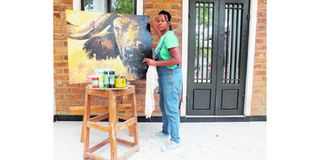Rising woman: How Riziki touts women inclusivity in the art space

What you need to know:
- The talented artist explains how women can flourish in the arts stakes - but if only equal opportunities are accorded to both women and men
With the expansive nature of art as a creative form of expression, it leaves a lot of unanswered questions on why female artists do not flourish as well as their male counterparts.
But, the crux of the problem may not be so much of a puzzle. After all, since time immemorial, women have mostly been associated with textile or fibre-related artworks - although leaving them unrecognized in other types of art, engaging in visual and contemporary arts. Compounding the issue is the fact that most historical works of female artists in drawing and painting have been spoken about as if they belonged to male artists - thereby overlooking the efforts of female artists thus denying them a spot in the limelight.
However, there are bold women in the art space who have refused to play second fiddle and are claiming their rightful spot in the industry.
The Citizen Rising Woman held a conversation with a unique botanical illustrator, artist Riziki Kateya - who is based in Arusha, Tanzania - to catch up with her on her journey and position in the arts world as a female artist.
Riziki is a family woman and a mother of two. She studied art by earning a Diploma in fine and performing Arts from Bagamoyo College of Arts.
Her journey as an artist started when she was in middle school. “I was known as an art lover by my classmates and my teachers observed that I was good in all art lessons. My family was also very keen on my talent and, therefore, I was advised to finish my basic education first and then pursue art as a profession,” Riziki opens.
The creative artiste also shares that her inspiration for art is credited to her father who is also an art lover.
“My father was an art teacher before turning into an artisan. I enjoyed his work as well as his encouragement which created a foundation for where I am today,” says Riziki.
Riziki’s artistic journey began at Bagamoyo College of Arts where her handwork and hard work paid off and she won a scholarship to the Royal Botanic Gardens, in New England for a three months course.
Riziki then returned from the UK as a botanical illustrator artist and worked with different creatives. Some of her notable works in the art world include working on Saint Paulia project which dealt with African violets, other wildflowers and endemic species in the Eastern Arc Mountains of Tanzania. Riziki has also worked on endangered flora and fauna of Tanzania in mountains, forests and National parks.
This resulted in her producing local guide books of the Uluguru and Mikumi National Parks for the sole purpose of raising awareness on conservation of Tanzania’s natural treasure.
Riziki is a multifaceted artist who indulges in more than one style of art and muse, she also paints wildlife animals and does abstract art and other contemporary artwork, working with a different medium such as acrylics and watercolours on paper and canvas materials.
Art is a livelihood for Riziki. However, being a woman and a mother, she faces numerous challenges in the art field. Riziki dots that just like in any other industry, the art industry faces gender issues as well. “As a female artist, society perceives me differently, hesitates in accepting and supporting my work, I’m generally not treated the same as male artists,” she says.
Riziki also adds that being a wife and a mother in many of the African societies and most parts of the world and maintaining the artist status tends to bring an internal battle to the artist themselves and it takes a while for the family to understand what the mother is doing. For Riziki, she proudly states that she overcame both battles.
Still on women, Riziki says “My advice to the community is that, being a talented girl or woman is not a crime but a gift – a natural talent that one has been given. Unfortunately, women in many cases have been discriminated against, despised and ignored for just being women.
“We are secluded to the roles of wives, mothers and caregivers only and unfortunately, even until today some people don’t see women beyond that. I am, therefore, asking the community to look at women from a different angle, with a respectful eye and mind, only then will they realize how much potential women hold.”
Riziki adds by saying she comes from a family that sees women as equals and supports them and respects their ideas, feelings and decisions. She says imperfections and shortcomings should be looked at as human frailty and not a feature inherent in women.
Regarding her future plans as an artist, Riziki says she intends to maintain an upward trajectory by joining other artists and finding more platforms that could offer more opportunities for them to reach a wider audience and a right place where visual art is appreciated for what it is, valued and traded at the right price.
Not only that, the artist holds a broader vision of having a proper art studio, where she can invite and work with different upcoming young artists and other pioneer artists because she believes there is always so much to share and learn from each other.




